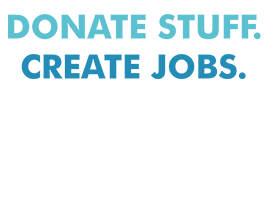[vc_row][vc_column][vc_gallery interval=”3″ images=”10256,10257,10258″ img_size=”full”][vc_column_text]The closet has been cleared out and the boxes of donated clothes dropped off at Goodwill Hawaii will be sorted and sold at one of the organization’s two stores on the island.
What happens next?
The impact of the donated boxes is considerable: 90 percent of revenue from sales funds multiple job training programs offered across the Big Island.
The mission of those programs is to help people facing employment barriers “become self-sufficient and reach their full potential,” said Kelley Cho, director of public relations and communications for Goodwill Hawaii.
Different programs are tailored to different populations, which include low-income families, immigrants, non-citizens, recently paroled offenders, Native Hawaiians, people with intellectual or developmental disabilities, veterans and at-risk youth.
In spite of the different groups served, each program’s main focus is job training. Goodwill assists with everything from job searches to filling out resumes to interview preparation.
“Once they’re placed in their jobs, we also provide training to help keep that job, and how to move up,” Cho said.
Last year, Goodwill Hawaii helped more than 2,500 people on Big Island.
One of those people is Trinity Mangauil.
Mangauil was referred to the First to Work program by the state Department of Human Services about three years ago, shortly after her oldest son has been diagnosed with a terminal sarcoma — a type of soft tissue cancer.
At the time, Mangauil, a survivor of domestic violence, was a single mother of four with no high school diploma.
She is now a substance abuse counselor for CARE Hawaii. She earned her diploma through the Pane‘e Mua Project and attended Hawaii Community College for a time, ultimately deciding to become more financially secure before completing a college degree.
In addition to her full-time job, she also has a cake decorating “hobby business” that she hopes to turn into a full-time business at some point.
“It’s been a long journey, and it’s still going,” Mangauil said Friday.
The list of people she credits with helping her through the most challenging portions of her life is extensive: her children, Ross Kaya at the Malama Market, where she learned to decorate cakes, Nani Na‘ope and Jan Crum at Pane‘e Imua, her elders Kimu and Leila Pihana, CARE Hawaii’s Sherrie Yamagishi, and Goodwill Hawaii’s Debbie Waihehe.
What they all have in common is their belief that Mangauil could succeed.
“People who know I can come through,” she said. That was especially important after her son passed away, and Mangauil was fighting depression and trying to stay strong for her other children.
She said that starting First to Work classes and being asked to write down her goals for the future was instrumental in her ongoing journey.
Once things were written down, she could see more clearly what she needed to do.
“I could see it for myself,” she said.
Her ongoing training classes helped secure the Malama Market bakery position, and, later, the CARE Hawaii job.
“You get opportunities, and you’ve got to take them,” Mangauil said, adding that her faith played an important role in helping her along. “One thing I try not to do is limit myself.”
Mangauil encourages others to take the same attitude. It’s rewarding for her to now be in a field where she is able to take care of people, she said.
“I want to continue to work with people,” Mangauil said.
“What I can share can always help somebody else.”
For more information about Goodwill’s End of Year Giving Campaign, visit goodwillhawaii.org/holiday.[/vc_column_text][/vc_column][/vc_row][vc_row][vc_column][vc_column_text]This article originated from http://www.hawaiitribune-herald.com written by Ivy Ashe. Email Ivy Ashe at iashe@hawaiitribune-herald.com.[/vc_column_text][/vc_column][/vc_row]

